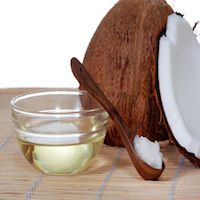Coconut Oil May Be the Answer for Fungi in the GI Tract
Coconut oil can control the overgrowth of the fungal pathogen Candida albicans (C. albicans) in the gastrointestinal (GI) tract.

Coconut oil can control the overgrowth of the fungal pathogen Candida albicans (C. albicans) in the gastrointestinal (GI) tract.
High levels of C. albicans in human GI tracts can result in bloodstream infections like invasive candidiasis, so research results published in mSphere found that using dietary approaches could be an alternate method to antifungal drugs to decrease the risk of C. albicans-induced infections.
While antifungal drugs can be used to both decrease and control C. albicans in the gut, repeated use of antifungal drugs can lead to drug-resistant strains of fungal pathogens.
As such, Carol Kumamoto, PhD, professor of molecular biology and microbiology, Tufts University School of Medicine, and Alice H. Lichtenstein, DSc, investigated the effects of three different dietary fats on C. albicans in mice gut: coconut oil, beef tallow, and soybean oil.
Study results indicated a coconut oil-rich diet compared to beef tallow or soybean oil-filled diet actually reduced C. albicans in the gut. Giving coconut oil alone, or even the coconut oil and beef tallow combination, lowered the level of C. albicans in the gut by more than 90% compared to beef tallow alone.
According to Kumamoto, “These findings suggest that adding coconut oil to a patient’s existing diet might control the growth of C. albicans in the gut, and possibly decrease the risk of fungal infections caused by C. albicans.”
“Food can be a powerful ally in reducing the risk of disease. This study marks a first step in understanding how life-threatening yeast infections in susceptible individuals might be reduced through short-term and targeted use of a specific type of fat,” remarked Lichtenstein in a news release.
Kearney Gunsalus, PhD, Institutional Research and Academic Career Development postdoctoral fellow at the Sackler School, concluded, “We want to give clinicians a treatment option that might limit the need for antifungal drugs. If we can use coconut oil as a safe, dietary alternative, we could decrease the amount of antifungal drugs used, reserving antifungal drugs for critical situations.”